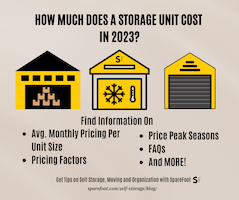Updated: December 21, 2022
When you need to transport a lot of possessions to a self-storage unit or to a new home, hiring movers to do the job can be expensive. In fact, according to the American Moving & Storage Association, the average professional moving job within the same state costs about $1,170. On the other hand, you can rent a moving truck for less than $100 a day, according to price comparison site CostHelper.com.
If money’s a major concern, doing it yourself with a rental truck could be your best option, but it’s important to develop a plan, said Kevin Kleckner, director of national consumer sales and programs at Penske Truck Rental. Especially if you’re not sure what size moving truck will suit your needs. Here’s what you need to know to get the best deal on a moving truck and take charge of your move.
1. Estimate the Size
The last thing you want to do is rent a truck that’s too small and end up having to make multiple trips. How do you know what size moving truck you need? Can you measure the cubic feet of your apartment? Do you have a one-bedroom or two-bedroom apartment? Most truck rental companies will help you determine the right size rental truck you need based on the items you’re moving, your dorm size or the number of rooms your belongings fit into. For example, Penske Truck Rental estimates that if you’re moving one to two rooms’ worth of belongings, you’ll need a 12-foot moving truck. Meanwhile, if you’re moving five to seven rooms’ worth of belongings, you’ll need a 26-foot truck. Penske Truck Rental offers a “Truck Wizard” to help you make this determination.
2. Plan and Book Early
People are more likely to diy their move during the summer than other times of the year, so moving trucks may be more difficult to book between Memorial Day and Labor Day. The end of the month is particularly busy, Baptisti said, so you might find it hard to get a truck during that period if you wait until the last minute. To be on the safe side, reserve your truck with a moving company at least a couple of weeks in advance.
3. Compare Prices and Other Factors
You’ll need three pieces of information to score the best deal possible with moving companies: the size for the truck you’ll require, the distance you’ll be going and the dates you’ll be moving. Rental truck companies typically charge a daily rate, along with a certain amount per mile. For example, you may be quoted a rate of $29.99 a day in addition to 79 cents per mile.
The rates also may vary based on the day of the week or the time of the year. You may get a better deal on days when moving trucks are not in high demand,so if you’re flexible, see whether your rate changes if you rent the truck midweek as opposed to over the weekend.
While price should be a factor, it probably isn’t the only one to consider. If you’re moving from one location to another and don’t want to return the truck to the original location, your options may be limited. For example, Penske offers one-way rentals, but Ryder does not.
4. Consider Logistics
You might need more than just a moving truck. For example, hand trucks are two-wheel carts that make it easier to move heavy furniture, and furniture pads can protect your furniture and your floors during the moving process.
Another thing to consider: the route that you’ll be driving for a long-distance move, since some roads prohibit trucks, according to Budget Truck Rental. On the day you rent the truck, you’ll need your driver’s license and a major credit card. Before taking off, check the truck to ensure you’re not blamed – and charged – for damage that already existed.
5. Make Sure You’re Insured
It’s great to think positively, but you’ve got to weigh what would happen if you were to get into an accident with the rental truck or if your belongings or pieces of furniture were stolen during the move. When you rent a car with a credit card, your card issuer typically provides rental car insurance, but this isn’t the case with a moving truck; neither Visa nor MasterCard extends that privilege.
Your home and auto insurance policies may provide some coverage, but check with your insurance company to make sure you don’t need supplemental coverage, according to the Insurance Information Institute. Even if your car insurance policy will cover a moving truck, there may be exclusions based on the size, according to the National Association of Insurance Commissioners. For example, a 10-foot truck might be covered under your policy, but a 24-foot truck might not.
Keep in mind that the truck rental company probably sells insurance with these features:
- Damage waivers protect you from forking over money to cover damage to or theft of the moving truck.
- Supplemental liability insurance stops you from paying for property damage and bodily injury claims filed against you.
- Personal and cargo policies protect your property while it’s inside the rental truck.
- Auto tow protection covers damage to or theft of your personal vehicle if you’re towing it on a trailer.



